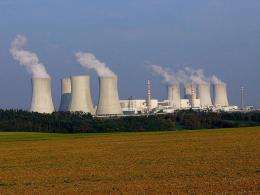April 3, 2013 report
Climate researchers claim nuclear power has prevented approximately 1.84 million deaths

(Phys.org) —Climate researchers Pushker Kharecha and James Hansen (a NASA scientist and environmental activist) have published a paper in Environmental Science & Technology, in which they claim that using nuclear energy to create electricity instead of burning coal has resulted in preventing approximately 1.84 million deaths. Their numbers come from calculating how many people would have likely died due to air pollution over the years, but didn't, because electricity was created by non-air polluting nuclear power plants instead.
Kharecha and Hansen argue that burning coal over the years that nuclear power has been used as a viable energy source, (since 1971) instead of building nuclear plants would have led to deaths from lung related ailments from both the mining of coal, and burning it to create electricity. They have then used the number of deaths in the past from such ailments to project numbers in the future. They say that if the world would convert to all nuclear power by the middle of this century, 420,000 to 7 million deaths could be prevented. The numbers vary so much because they would depend on which energy source nuclear power would replace. Their overall point is that nuclear energy is much safer than coal—when looking at raw death numbers—and therefore should be seen as a replacement source for electricity generation, rather than as menace that should be abolished.
Public opinion has swayed in the aftermath of the Fukushima disaster two years ago, providing stark evidence of the terrible toll that nuclear energy can take—it also reminds the public of Chernobyl and has created fear and reluctance to build new plants, particularly among those who might live near one. But, Kharecha and Hansen counter, burning coal has another problem—it also results in the pumping of gigatons of greenhouse gasses into the atmosphere causing global warming, which could also lead to deaths due to flooding of coastal areas as ocean levels rise. It's a matter of risk analysis, they say, not of emotion—nuclear energy is clearly the safer technology and because of that, efforts should be undertaken to build more nuclear plants and to shut down coal plants while awaiting the maturation of other new technology such as wind and solar power.
More information: Prevented mortality and greenhouse gas emissions from historical and projected nuclear power, Environ. Sci. Technol., Just Accepted Manuscript, DOI: 10.1021/es3051197
Abstract
In the aftermath of the March 2011 accident at Japan's Fukushima Daiichi nuclear power plant, the future contribution of nuclear power to the global energy supply has become somewhat uncertain. Because nuclear power is an abundant, low-carbon source of base-load power, on balance it could make a large contribution to mitigation of global climate change and air pollution. Using historical production data, we calculate that global nuclear power has prevented about 1.84 million air pollution-related deaths and 64 gigatonnes (Gt) CO2-equivalent greenhouse gas (GHG) emissions that would have resulted from fossil fuel burning. Based on global projection data that take into account the effects of Fukushima, we find that by mid-century, nuclear power could prevent an additional 420,000 to 7.04 million deaths and 80 to 240 GtCO2-eq emissions due to fossil fuels, depending on which fuel it replaces. By contrast, we assess that large-scale expansion of natural gas use would not mitigate the climate problem and would cause far more deaths than expansion of nuclear power.
Journal information: Environmental Science & Technology
© 2013 Phys.org



















